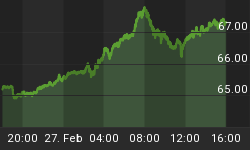This is an excerpt from the RSG Newsletter dated August 1, 2009.
A huge portion of Chinese national wealth is currently held in the US dollars (US government, agency and corporate debt). There are $6.5 trillion of currency reserves in the world today. $4.3 trillion is held in the US dollars and 34% of US dollar holdings, $1.43 trillion, belong to China.
A decline in the US dollar exchange rate is extremely undesirable for the Chinese - the biggest holder of US debt in the world. Nevertheless, over the past few months, China repeatedly attacked the status of the USD as the world reserve currency.
China's proposal to use IMF's Special Drawing Rights (SDRs) to replace the USD as the world reserve currency is supported by India, Brazil, Russia and even France, but for many reasons cannot be put in place any time soon. The Chinese are likely to recognize this as well.
First, it is important to understand what the Chinese are trying to accomplish by backing SDRs. The main goal of the international/financial policy of China is to decrease the US dollar's importance in world trade while maintaining the USD's value and stability. This is a logical goal given the decrease in the United States' share of global output over the past decade.

If accomplished without any major shocks to the global economy (an ideal scenario), China will become less dependent on the greenback.
The Chinese are trying to accomplish its goal in three ways:
-
China is trying to raise renminbi's weight in international trade by signing bilateral currency swap agreements. As of today, this has been accomplished or is being negotiated with all countries of the ASEAN, Russia, Brazil, Argentina and others. China's goal is to settle 30% to 40% of all trade in renminbi in the next three years. This will help replace $1-2 trillion dollars in world trade.
-
The next priority for China's economic policy is the reduction of its dependence on the US dollar exchange rate when purchasing natural resources. China is already investing a large portion of its surplus dollars into strategic reserves of natural resources, into the development of resource-rich areas in the under-developed world as well as into resource and energy companies.
-
The Chinese government understands that the key to strengthening their national economy is to increase the share of consumption in China's GDP. Today, China is a third world economy by size but its consumption per capita ranks only 132nd. Targeted stimulation of a huge internal market for China's goods is the most important but also the most difficult goal for China today. At first look, consumption per capita growth of 8.9% year-over-year is quite impressive. But in the context of a tremendous explosion of new credit happening in the country today, such a level of growth may not be sustainable.

Only by successful navigation through all three challenges listed above will China be able to eliminate its dependence on the dollar and begin to make renminbi a freely convertible major world currency in the next ten years.
The dollar trap is a huge problem for China and no quick resolution is possible. As a result, China has a vested interest in the stability of the US dollar exchange rate for many years to come.
As far as the hypotheses about the multi-fold increase of gold's share in China's monetary reserves - while they may be correct - the process is likely to take a very long time. China, like any other major economy, is not interested in seeing gold prices increase and will make significant purchases only when large quantities are available for sale from other central banks. China is unlikely to buy gold in the open market unless gold falls significantly from current levels - providing a safety net for gold investors.
For years ahead, fuel for the precious metals bull market will continue to come from private investment demand which promises to rise sharply. A new wave of inflation in the coming years is inevitable.















